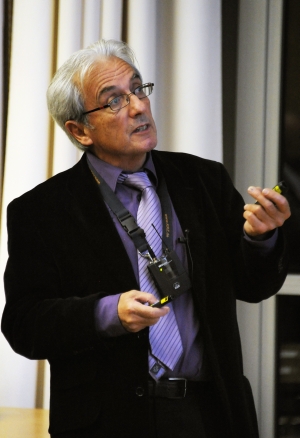
Prof. Albert Fert, Nobel Laureate in Physics (2007, Giant Magnetoresistance) gave a talk on spintronics on October 25 at TU Dresden.
The talk given by the Professor of Physics at Universite Paris-Sud and scientific director of the Unite Mixte de Physique CNRS-Thales (Orsay) was the first one in a lecture series within the proposed Cluster of Excellence "Center for Advancing Electronics Dresden (cfAED)". The cfAED aims at finding innovative and promising paths for the future development of electronic information processing systems. This is especially relevant since the progress in conventional technology for electric information processing (CMOS) will soon be reaching its physical limits, thus slowing down the biggest promoter of progress in today's world.
Spintronics investigates the influence of the spin orientation of electrons on electronic charge transport and utilizes the resulting effects systematically. The most prominent of these effects is giant magnetoresistance in magnetic multi-layer systems, which sets the basis for novel read heads resulting in a massive increase in memory capacity of common hard discs. Beyond this, modern spintronics deals with a large variety of promising effects - not based on common electronics circuitry - that give rise to more efficient solutions for information processing technology.
In his talk, Prof. Fert introduced the basis of spintronics, especially pointing out topics in recent research such as spin transfer and applications for memory technology. Furthermore, the use of microwaves, graphene, carbon nanotubes, the spin-Hall-effect and approaches for neuromorphic engineering were discussed.
This event was supported by the newly established Collaborative Research Centre ("Sonderforschungsbereich") 912: HAEC - Highly Adaptive Energy-Efficient Computing.
Video of Prof. Fert's lecture

Prof. Albert Fert, Nobel Laureate in Physics (2007, Giant Magnetoresistance) gave a talk on spintronics on October 25 at TU Dresden.
The talk given by the Professor of Physics at Universite Paris-Sud and scientific director of the Unite Mixte de Physique CNRS-Thales (Orsay) was the first one in a lecture series within the proposed Cluster of Excellence "Center for Advancing Electronics Dresden (cfAED)". The cfAED aims at finding innovative and promising paths for the future development of electronic information processing systems. This is especially relevant since the progress in conventional technology for electric information processing (CMOS) will soon be reaching its physical limits, thus slowing down the biggest promoter of progress in today's world.
Spintronics investigates the influence of the spin orientation of electrons on electronic charge transport and utilizes the resulting effects systematically. The most prominent of these effects is giant magnetoresistance in magnetic multi-layer systems, which sets the basis for novel read heads resulting in a massive increase in memory capacity of common hard discs. Beyond this, modern spintronics deals with a large variety of promising effects - not based on common electronics circuitry - that give rise to more efficient solutions for information processing technology.
In his talk, Prof. Fert introduced the basis of spintronics, especially pointing out topics in recent research such as spin transfer and applications for memory technology. Furthermore, the use of microwaves, graphene, carbon nanotubes, the spin-Hall-effect and approaches for neuromorphic engineering were discussed.
This event was supported by the newly established Collaborative Research Centre ("Sonderforschungsbereich") 912: HAEC - Highly Adaptive Energy-Efficient Computing.
Video of Prof. Fert's lecture